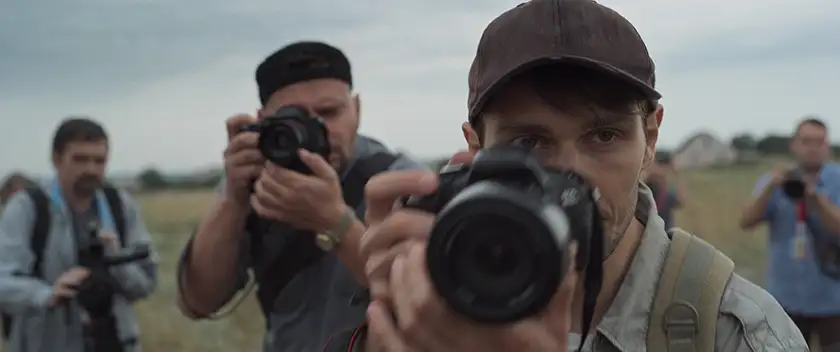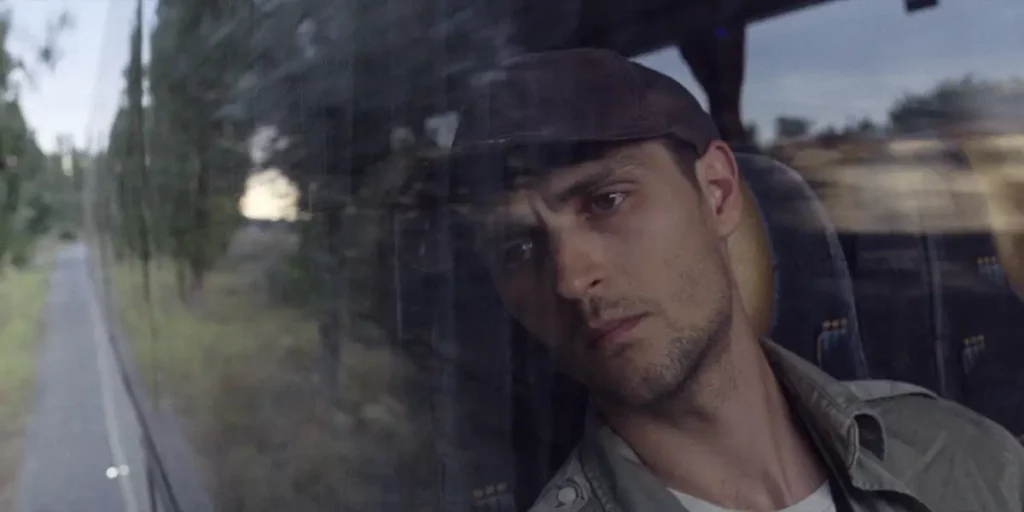The Editorial Office (Redaktsiya) is an absurd satire drenched in reality, acting both as a snapshot of a country on the brink of change and as a warning of a not-so-distant future.
At the beginning of The Editorial Office (Redaktsiya), we follow biologists Yura (Dmytro Bahnenko) and Mykhailo (Oleksandr Shmal) as they drive through the Oleshky Sands National Nature Park, in Southern Ukraine. They are trying to spot the nearly extinct Steppe Marmot, which was was sighted in that area by a local, and whose confirmed existence might help make the Oleshky Sands a Protected Area in the European Union. As their search continues, they stumble upon a series of oddities. “If you want to achieve some success, don’t waste time on random events,” Mykhailo tells the Yura, who was tempted to investigate further and stray from his mission. But as we follow Yura throughout the film, we realize that reacting to “random events” is what our young biologist-turned-journalist does, in the attempt to get his truth out to the world.
This all has to do with something that Yura and Mykhailo witness in the sands: some people dressed in military clothes are burning the forest, and being very shady about it. Realizing that they’re witnessing arson, our heroes take pictures and videos of what they see, determined to make the rest of the world aware of what’s been happening. But Yura soon realizes that – to borrow the words of a journalist he’ll meet later in the movie – “no one gives a sh*t about the truth,” as what they really crave is engaging with something that provokes emotions in them. Which is exactly what the media feeds them. We’re past the era of “phony sincerity:” what we seek is silly entertainment to share on our socials and gruesome details to get us talking. A woman committed suicide, but which floor did the jump from? What did her husband do when he found out? And was she fully clothed?
Yura learns all of this on his quest to get his truth out there, and he’s even more determined to do so after discovering that Mykhailo has vanished. After being rejected by a respected newspaper, he reaches a, ahem, less reliable (but hilariously named) local news agency. Though said news agency may or may not be able to publish the article – in the same way that the “vivid, sexy, and viral” Mayor of the city may or may not be in a coma – they offer him a job in social media. And when the authorities knock on his door, taking his videos from the arson, he has no option left but to accept.
The rest of the movie is so bizarre, so drenched with socio-political commentary, and so filled with unbelievable twists and unlikely coincidences that it’s best if you discover it on your own. But The Editorial Office certainly has a lot in store for you, as writer-director Roman Bondarchuk (Volcano) and co-writers Dar’ya Averchenko and Alla Tyutyunnik give us a tale that’s, at the same time, unapologetically absurd and incredibly relatable. Behind all the symbolism, the satire, and the insanity of Yura’s sensationalistic adventures is a country in chaos, that – when the film was shot, right before the war – was desperately trying to make sense of it all. And now that the war is ongoing, the Oleshky Sands are occupied, and most of the region has been destroyed, The Editorial Office assumes even more meaning – a bittersweet quality that can be perceived in every single, gorgeous shot.

When it comes to the film’s satirical aspects, you’ll love seeing the actual marmot from time to time, and there’s also a fantastic scene that I won’t spoil about a writing on a wall that absolutely nails the kind of clever, ironic commentary the writers were going for. Yura’s mum (Rymma Ziubina), with whom he lives, is the kind of person who believes everything she reads, and her adventures in the world of cryptocurrency and insurance are both hilarious and all-too-relatable. We hardly ever see the Mayor, but he’s a constant presence nonetheless since everyone’s talking about him, and the idea that nobody knows if he’s even alive or death adds even more meaning and hilarity to the film.
There are also a few comedic scenes that I could have done without, from a couple of morbid shots to some surface-level commentary on gender politics, and also a spiritual twist that took the movie’s premise a little bit too far for me. It also feels like the film is a little bit too long overall, but I have the impression that The Editorial Office is also the kind of movie that’s meant to be a tiring watch, just so its message can really sink in at the end. It’s also an incredibly well-acted film, even more so considering that Dmytro Bahnenko – or Dima, as he’s known in Ukraine – is a famous journalist who had never even acted before, but whose experience on the field made him the perfect choice for this role: no one could have embodied Yura in the same way that he does here.
“What do I do to keep my truth from drowning?,” asks Yura’s colleague Lera (Zhanna Ozirna), near the end of the movie. And it feels like Bondarchuk and the team behind the film – and perhaps Ukraine, or even the world as a whole – are asking themselves the very same thing. In The Editorial Office, the answer is a bleak one: even if you manage to get your truth out there, people will ignore it until ignorance and lies destroy us, and then, when everything is over and we’re ready to build again, the same cycle begins once more. As I write, Dmytro Bahnenko is still recording and sharing his truth, and this makes Redaktsiya even more of an essential watch, not only a snapshot of a country on the brink of change, but also as a warning about a not-so-distant future.
The Editorial Office (Redaktsiya) premiered at the 2024 Berlin Film Festival. Read our interview with writer-director Roman Bondarchuk below!

